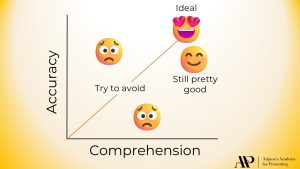😕 Huh?
This is the last reaction you want from your audience. As a speaker, your job is to make sure everyone understands you 🎤.
But what if your topic is too complex, and you don’t have time to explain it in detail?
That’s when you step into the gray zone between accuracy and comprehension, where comprehension should be tipping the scale ⚖️.
For example: in my last post, I wrote about virus “inactivation.”
But many people aren’t familiar with that term. So if I don’t have time to explain it, I’ll say “destroy” or “kill.”
Are these words perfect synonyms for “inactivate”? No.
Are they close enough to help the audience understand the idea? Absolutely.
And that’s the point: sometimes you need to trade a little precision for a lot of clarity (and I know how difficult this often is, especially for scientists). Not by saying anything false, absolutely not, but by choosing the version your audience will actually understand.
Because if they don’t understand you, the value of your talk is lost, no matter how accurate it is.

